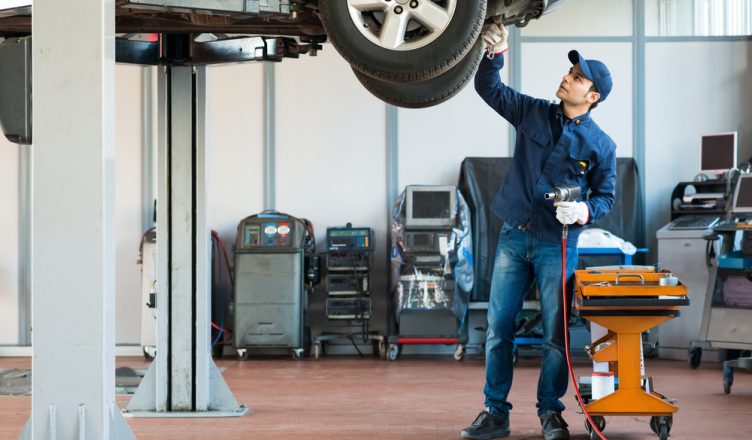Table of Contents
You planned optimized routes and assigned them to your drivers to ensure timely deliveries.
You’re happy, thinking that you’ve done your main job and no longer need to worry about it.
But, after an hour or so, you get a call from your driver that the vehicle broke down in the middle of the road. And, that in a remote area too!
The result is a delay in the courier deliveries, leading to annoyed customers.
That won’t be a good sign for your courier business, right?
But, you can avoid such instances by having a periodic vehicle maintenance process in place.
Remember, a lack of maintenance can cause road mishaps or reduce your vehicles’ performance as well.
Injuries from accidents due to non-maintenance cost around $2 billion a year. And, not maintaining your vehicle can cost as much as $8,000!
So, here are six ways you can take care of your vehicle to avoid any kind of glitches.
#1 Change the Air Filters
Air filters restrict dirt, dust, and debris that go to your engine. So, it ensures that your vehicle’s engine gets the clean energy needed to turn fuel into power. This improves the engine’s performance and extends the life of your vehicle as well.
So, you cannot leave off changing the air filter of your maintenance checklist.
You should change the air filter every 12,000 miles or 12 months, whichever comes first.
The process is simple. So, you can change it on your own in 10 minutes or hire a mechanic to do it.
Remember, it is completely fine if the air filter has a little dirt, as it helps to restrict tiny particles.
Want To See For Yourself How Route4Me Can Boost Your Profits?

#2 Replace the Spark Plugs
Many think that consistent problems with starting a car are due to a problem with the battery.
But, that’s not always true.
It could also be because the spark plugs might not be generating enough sparks. Alternatively, the spark plug might be draining the battery.
And, that’s not all.
A problem with the spark plug could also cause:
- Engine misfiring,
- Engine surging, and
- A lack of acceleration.
So, you must change the spark plugs regularly to ensure top efficiency and performance. Ideally, it should be replaced after 30,000 miles, but check your vehicle manual first.
#3 Change the Oil and Oil Filters
When your courier vehicle is on the road, the engine keeps the vehicle moving.
And, because there are so many parts that work simultaneously, the engine can get hot.
But, oil is a savior here:
- It keeps an engine’s components operating smoothly.
- It keeps the combustion chamber cool.
- It keeps the varnishes and carbon from building up in your engine.
So, it is essential to change the oil regularly to avoid vehicle breakdowns or engine troubles. The best way to ensure that the engine can offer optimal performance is to use clean oil.
You should change the oil every 3,000 miles. But, with efficiently operating vehicles, you can likely only change it after 5,000 miles.
Yet, you may need to change your oil more often if your vehicles
- Are driven at high speed,
- Have an older engine, and
- Operate in an area that is dusty, cold, or hot.
But, it’s not just the oil that needs to be changed. The oil filter is also crucial as it sifts out particles to keep contaminants out of the oil.
If your oil filter is clogged or dirty, it will allow toxins to hit the engine. This will affect your fuel economy as well as damage the engine.
It could also block the oil flow to the engine, which could lead to engine failure.
So, make sure you change your oil filters whenever you change your oil to protect your engine.
#4 Replace the Radiator Fluid
Radiator fluid is the most vital part of any vehicle’s cooling system. It is a liquid mixture of water and antifreeze that keeps the engine cool while it is running.
It also protects the engine from getting blocked due to freezing temperatures, such as in the winter.
However, dirt and other pollutants can build up in the fluid over time, or the fluid can be acidic. When this happens, you must change the radiator fluid immediately!
So, a best practice is to change the radiator fluid periodically. This will ensure that your vehicle’s cooling system functions at its best.
Ideally, you should change fluid after 24,000 to 36,000 miles or every 24 to 36 months.
But, how frequently you should do it may also depend on the areas in which your drivers operate.
If they drive through hot temperatures, you may need to change it every 12,000 to 15,000 miles every year.
#5 Change the Brake Pads
Brakes are one of the most crucial parts of any vehicle. And, you cannot ignore maintaining them if you’re serious about safety.
Drivers and businesses often overlook the need for new brake pads. This might be because they do not see the warning signs of damaged brake pads.
Don’t make the same mistake!
You should pay attention to the following signs to find out whether your brake pads need a change:
- The vehicle is taking longer to stop than it should.
- The vehicle wants to make right- or left-hand turns while driving or braking.
- It makes a noisy sound when you apply the brakes.
- There is a leak or fault in any of the brake lines.
- There are drops of brake fluid near the wheel.
However, it is advisable to replace the brake pads every 20,000 miles. But, courier businesses involve a lot of stop-and-go driving. So, you may need to change it more frequently.
#6 Other Vehicle Maintenance Tips
Besides the above-mentioned crucial tips, you should also maintain the more minor things. These include the:
- Windshield wipers,
- Windshield washer’s spray nozzles,
- Seat belt functionality,
- Side window functionality,
- Heating and air conditioning systems,
- Window defrosters,
- Door function and alignment,
- Power steering fluid level, and
- Battery.
You should also make sure that you do not overlook any observable defects, such as:
- Inoperable required lights,
- Flat tires,
- Fluid leaks, and
- Missing hazardous material placards.
Such defects trigger 63% of road inspections. They also put your vehicles or business under Federal Motor Carrier Safety Administration’s radar.
So, you must have a regular maintenance schedule to avoid such inspections. Especially since they could be a legal hassle later on.
Final Words about Vehicle Maintenance
Periodical maintenance increases the efficiency of your vehicles and ensures your driver’s safety.
Also, if your vehicles don’t face any glitches, your deliveries will never be delayed. So, your customers will be happy, and you will be protected from penalties or legal hassles.
However, keeping a regular check on every small thing of a vehicle could be a daunting task. So, you may opt for a multi-stop route planner to simplify and automate the job.
Such software plans the routes and tracks how many miles each vehicle has traveled.
Let’s say one of your vehicles travels 100 miles a day, and you must change the oil every 5,000 miles. The route optimizer can show you when the vehicle has already traveled 3,000 miles. So, you can then calculate that you need to change the oil after 20 days. That’s it!
You can even use it for the entire vehicle maintenance schedule or to maintain specific parts.
Want To See For Yourself How Route4Me Can Boost Your Profits?





